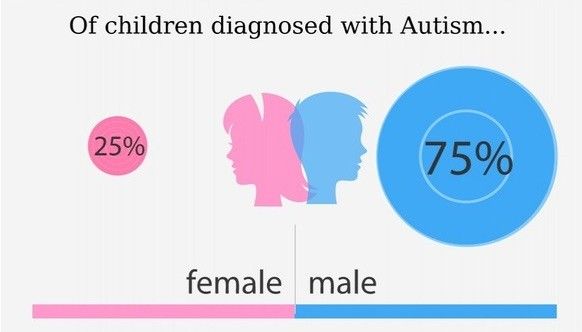Autism is not a disease, it is a little-understood developmental brain disorder. Autism is the most common condition in a group of developmental disorders known as the autism spectrum disorders (ASDs). Autism is characterised by impaired social interaction, problems with verbal and nonverbal communication, and unusual, repetitive, or severely limited activities and interests.
In the medical sense, there is no cure for the differences in the brain that result in ASD. However, researchers are finding better ways to understand the disorder and help people cope with the various symptoms. Some symptoms can lessen as the child ages and others disappear altogether. With appropriate intervention, many behaviours can be changed for the better, even to the point that the affected individual may, to the untrained eye, seem perfectly normal. The majority of people with ASD continue to display some symptoms throughout their lives.
How does CBD oil work for people with autism?
All living things, including humans have an endo-cannabinoid system that receives signals from cannabinoid that enters the body. When you ingest CBD it enters your bloodstream, brain and nervous system almost immediately.
The endo-cannabinoid system moves in the opposite direction when compared to neuro-transmitters. It moves up to the neurons and attaches to the cannabinoid receptors of the neuron that send “messages”. Once there, the cannabinoids control what happens the next time the neurons activate and can effectively change what happens to the body and mind.
Among other things, endo-cannabinoids can help regulate hunger, anxiety, neuronal excitability, protections and pain. Those who have trialled cannabinoid (CBD oil) medicine to help with autism believe that it can help bring order to the brain. It is well known that individuals with autism struggle with focus and attention, and CBD oil can alter their spectrum of attention. CBD in higher doses helps as lower doses can sometimes aggregate behavior. CBDacid helps as an anti-inflammatory, anti-convulsant, reduces anxiety and reduces aggression.
Is CBD an effective treatment for autism?
Often parents with children who have very severe autism are frustrated with a lack of effective options. It is now legal in Australia to prescribe CBD as a last resort, when traditional medications don’t work. With not much clinical evidence available to date, that doesn’t mean there isn’t possible evidence in the future.
There are several reports from parents claiming their children benefited positively after including CBD oil in their treatment, such as a decline in aggressive behaviour, a significant decrease in seizures, improved speech, including children who did not speak before and achieved significant results in a short period of time after their first dose of CBD oil. This is what generates hope in other parents who seek comfort and a better quality of life their children. There’s a lot of promising aspects about medicinal cannabinoids as an effective treatment for autism.
Do the benefits outweigh the risks?
There are multiple factors to consider when answering these questions. The simple answer is that there has not be a great deal of research done for paediatric patients with autism, validating the idea that CBD oil is an effective and available option for the treatment of autism yet. Nevertheless, reports of this “miracle drug” that has so many proven success stories world-wide, cannot be ignored.
For an individual with autism, a developmental disability with no proven “treatment”, you’re open to many therapies and strategies that might alleviate symptoms. CBD itself has shown promising results as a treatment for a variety of conditions, many of which are otherwise not treatable.The most well-known properties of CBD are neuro-protective, anti-convulsant, anti-inflammatory and analgesic. CBD also possesses therapeutic properties to treat conditions like depression, anxiety and dependence. Some reports show a decline in aggressive behaviour, significant decrease in seizures, and improved speech. There have even been documents accounts of children who did not speak before CBD treatment, who achieved significant results in a short period of time after their first dose of CBD oil.
Can the benefits of CBD oil for autism be proven?
In many studies of CBD oil, there have been clinical trials done with adults, but they are not specific to children, in the use of CBD oil for anti-psychotic, anti-depressant or sleep issues. A recent retrospective study of individuals with ASD did report improvement in disruptive behaviour, anxiety, and communication.
In 2018, a paediatric neurologist in Israel began research with 60 children on the autism spectrum and while still to be published, some preliminary results have been released. These qualifying study subjects had not responded to previous conventional drug therapies. 80% of participants who were treated for 7 months with 20:1 ratio of CBD to THC saw improvements.
After the study, parents were asked about communication, behaviour and anxiety. 80% of parents noted a decrease in problem behaviour, with 62% reporting significant improvement in behaviour. Additionally, 50% noted an improvement in communication, 40% reported a decrease in anxiety (2/3 of the participants began the study with anxiety). The positive part of this study was that it was conducted with children with ASD – something that we don’t have a lot of research on. The outcome of the study was that caregivers reported improvement in at least one core symptom of autism – social communication, language, or repetitive behaviours. Additionally, sensory difficulties, food-base/texture tolerance, sleep disorders, and/or seizures improved as well.
CBD Oil for autism (and epilepsy)
Less than 2% of the general population has epilepsy, but up to 33% of people with autism also suffer from epilepsy. While scientists do not clearly understand the reasons behind the relationship, they suspect that the different brain development that occurs in autistic children is more likely to create circuits that cause epileptic seizures. In 2019, a US Food and Drug Administration advisory panel unanimously recommended approval of CBD medication to treat rare forms of childhood epilepsy. These two conditions have early onset in childhood and present with seizures that are difficult to control. The syndromes have impacts that grossly affect the child’s development and overall quality of life. This news is huge for the medical and autism community as this is the first time the FDA has approved a marijuana-derived substance.
The Endo-cannabinoid System
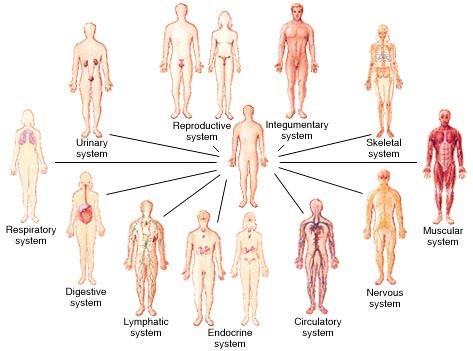
Major Organ Systems in Human Body
The endo-cannabinoid system (ECS) explains why natural cannabinoids in hemp have therapeutic effects. Before cannabis prohibition, hemp and marijuana had been used for thousands of years to treat a number of ailments, including autism. Traditional healers may not have known why the plant was effective but their experience demonstrated its effectiveness and provided the basis for later scientific inquiry. The discovery of the ECS revealed a biological basis for the therapeutic effects of plant cannabinoids and has sparked renewed interest in cannabis as medicine.
Research has shown that small doses of natural cannabinoids from hemp help support the ECS and enhance its signalling. This suggests that small, regular doses of naturally occurring cannabinoids from CBD oil might act as a tonic to our most central physiologic healing system.
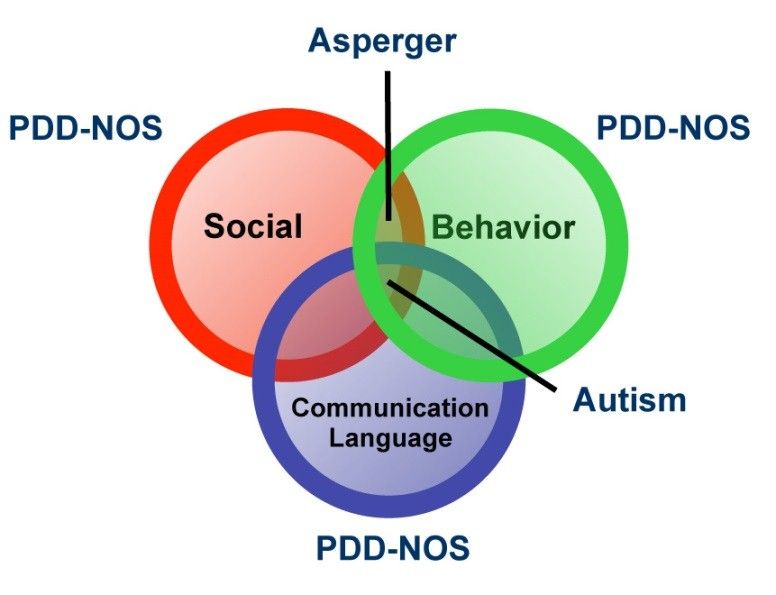
How autistic individuals are affected by the disorder varies widely. In fact, the variety of autistic-like disorders has necessitated the creation of the term Autism Spectrum Disorder, or ASD, to be used instead of the severe form of the disorder. Other ASDs include Asperger’s syndrome, Rett syndrome, childhood disintegrative disorder, and pervasive developmental disorder not otherwise specified (usually referred to as PDD-NOS). People with severe cases display self-injurious, aggressive, and unusual behaviours. The mildest forms may appear, at least to the layperson, to be a personality disorder, possibly associated with a learning disability.
A generation ago, autism was a condition most of us had heard of, but few of us had direct experience in. With the diagnosis of ASD on the rise, parents are looking for safe and effective therapies to manage the wide array of behavioural, communication and social impairment symptoms, and CBD oil is fast becoming recognised as that safe and effective option.
The onset of puberty can be a difficult time to autistic children. Many experience more frequent and severe behavioural problems, and about 25% of those afflicted begin to experience seizures during puberty. This is believed to be the result of hormonal changes.
The prognosis for autistic children is difficult to predict. There have been documented cases of apparent recovery from autism, usually after adolescence. Some children seem to progress well only to inexplicably regress. Many become marginally self-sufficient and independent. However, most autistic individual ultimately need lifelong care of some type.
During adulthood, appropriate living arrangements for people with ASD vary depending on the severity of each individual case. While those who are only mildly affected may be able to live on their own, other options can include living in a group home or residential home, or living with parents. For those who are severely affected, an institutional setting may be the only choice. While some autistic adults are unable to adapt to a regular lifestyle, others graduate from university, have careers, form relationships, and marry.
The Australian Federal Government legalised medicinal cannabis use in 2016 and regulates its prescription through the Therapeutic Goods Administration (TGA). The benefits of CBD on autism are currently being researched by the University of Sydney, with studies to date suggesting positive benefits of cannabinoids in low doses. CBD has shown to improve behavioural symptoms in ASD.
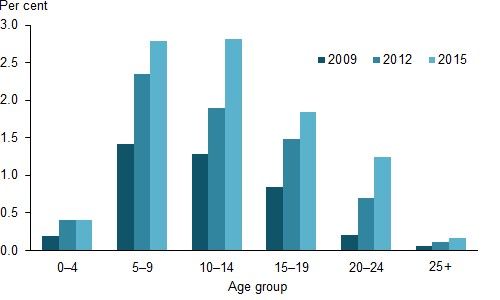
Autism Prevalence Rate up by an estimated 40% to 1 in 70 people
Autism Spectrum Australia (Aspect) has revised its autism prevalence rates from 1 in 100 to an estimated 1 in 70 people in Australia on the autism spectrum. That is an estimated 354,000 people in Australia.
Recent research both here in Australia, and overseas indicates that this figure is higher than previously estimated.
In spite of more than sixty years of research into the varying manifestations of autism and ASD and the families affected by it, the disorder continues to mystify doctors, psychologists, and scientists. It is clear that more children than ever before are being classified as having autism spectrum disorders (ASDs). But it is unclear how much of this increase is due to changes in how we identify and classify ASDs in people, and how much is due to a true increase in prevalence. By current standards, ASDs are the second most common serious developmental disability after mental retardation/intellectual impairment, but they are still less common that other conditions that affect children’s development, such as speech and language impairments, learning disabilities, and attention deficit/hyperactivity disorder (ADHD).
Males are three times more likely to have the disorder than females.
Recent studies suggest that some people have a genetic predisposition to ASD
Someone with ASD might at first appear to be mentally retarded or hard of hearing. But caregivers stress that it is important to distinguish ASD from other conditions. Physically, individuals with ASD do not appear different from others but exhibit marked differences in behaviour from a very early age. ASD is usually diagnosed in early childhood (before the age of three) and is characterised by a marked unresponsiveness to other people and to the surround environment.
It is estimated that families with one child with ASD have a 2 to 8 percent chance of having a second child with ASD.
While most babies love to be held and cuddled, infants with ASD may appear indifferent to love and affection, or may be overly agitated, crying most of the time they are awake. Children with ASD may not be able to form attachments to others in the way most children do and seem to withdraw into themselves. Many exhibit various unpredictable and unusual behaviours that can range from constant rocking, feet-pounding, or sitting for long periods of time in total silence. Some experience bursts of hyperactivity that include biting and pounding on their bodies.
According to the National Institute of Neurological Disorders and Stroke, the criteria used to diagnose ASD include the following:
- Absence of impairment of imaginative and social play
- Impaired ability to make friends with peers
- Impaired ability to initiate or sustain a conversation
- Stereotyped, repetitive, or unusual use of language
- Restricted patterns of interests that are abnormal in intensity or focus
- Apparent inflexibility with regard to changes in routine or rituals
- Preoccupation with parts of objects
Many children with ASD have learning disabilities and are often mentally disabled. Speech development is usually delayed and in many cases is absent or limited to non-sensical rhyming or babbling. Some children with ASD appear to have lower than normal intelligence, others seem to fall into the normal range, while some are highly intelligent. Unlike those with other ASDs, children with Asperger’s syndrome typically do not have problems with language or intellectual disability. To be accurately diagnosed with ASD, a child must be observed by a skilled professional, because diagnosis is difficult for a practitioner with limited training or exposure to ASD. Specialists suggest a multidisciplinary team that would include, for example, a neurologist, a psychologist, a developmental pediatrician, a speech/language therapist, and a learning consultant.
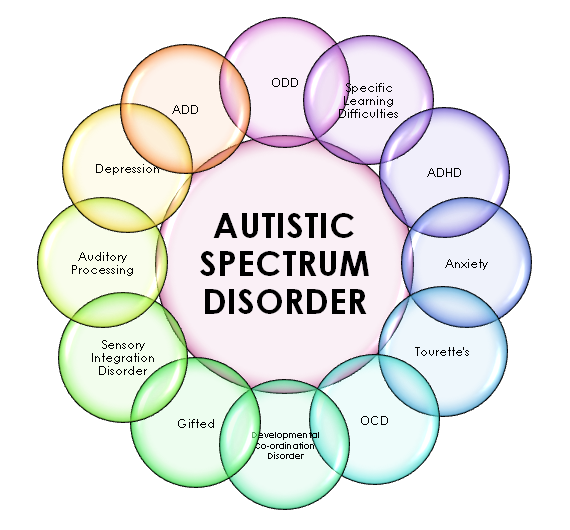
Individuals diagnosed as autistic savants attract a great deal of attention from the media and general public. Many movies, television reports, and newspaper articles highlight the extraordinary skills of these individuals, most particularly in the areas of mathematics, art, music, and memory. Such an individual might, for example, be able to multiply and divide large numbers or calculate square roots with little hesitation, paint like Rembrandt without ever having a drawing lesson, memorise an entire phone book, or be capable of reciting the birth date of every person he or she has ever met. Less than 1% of the general population is capable of such feats, but the incidence of such abilities is 10% in individuals who are autistic. No one knows why this occurs. One speculation is that autistic people have incredible concentration abilities and can focus complete attention on a specific area of interest.
The cause of ASD is unknown
Some experts believe that it is a result of a neurological imbalance or malfunction that renders the autistic individual painfully oversensitive to external stimuli. Many researchers believe that ASD may be the result of genetics and/or some environmental factors, such as certain viruses or chemicals.
Researchers are also studying how brain function differs in autistic individuals. Some theories suggest that brain development may have been interrupted in the early fetal stages in people who develop ASD. Other studies reveal a possible signalling problem within the brain.It is known that ASD is not caused by parental neglect or actions as was once believed.

Research continues to try to find the biological basis for ASD. The emergence of brain-imaging tools such as computerised tomography (CAT), positron emission tomography (PET), single photon emission computed tomography (SPECT), and magnetic resonance imaging (MRI) has allowed researchers to examine, in detail, portions of the brain never before seen in living people. In fact, instead of being able to single out one area of the brain that is affected, it looks as if many major brain structures are implicated in ASD. These include the cerebellum, the cerebral cortex, the limbic system, the corpus callosum, the basal ganglia, and the brain stem. Other research has focused on neuro-transmitters such as serotonin, dopamine, and epinephrine. Evidence now points to genetic factors as the cause of ASD, a theory that has been strengthened by twin and family studies, which suggest an underlying genetic vulnerability. Recent neuroimaging studies have shown that abnormal brain development, beginning in an infant’s first months, appears to be a contributing cause. This has resulted in a “growth dysregulation hypothesis” that holds genetic defects in brain-growth factors to be responsible.
Further Research
University of Sydney’s Lambert Initiative for Cannabinoid TherapeuticsGlobal Paediatric Health – Autism Spectrum Disorder and CannabidiolAutism Spectrum Australia (ASPECT).
At iCannabis we are focused on bringing the purest and most bioavailable medical cannabis to Australian patients and their families.We are a group who specialise in educating and helping Australia patients gain access to Cannabis for Medical purposes. Through education and real-life experiences with the healing powers of this plant.
Once you discover the documented benefits tens of thousands of patients around the world have received from the medicine, you too will realise how this can potentially change and improve the lives of you and your family.
The positive impact this plant has already had on the quality of life for patients and their families is nothing short of miraculous.
At iCannabis we are committed to establishing an Australian medical cannabis community comprised of passionate and caring people, focused on the highest quality organic medicine made with love and integrity.
If you need any advice or help with CBD PTSD care, or sourcing full spectrum cannabis oil treatments please contact us. We try to answer all emails within 24 hours and are happy to help and advise on all aspects of CBD treatments in complete confidence.

